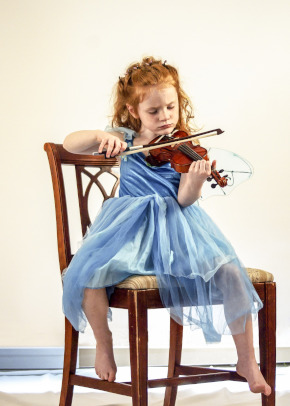Did you ever hear a person playing an instrument perfectly? Someone who can listen to a song just once and play it right back? I was very fascinated by it so I started my research on what is called perfect pitch.
Absolute pitch or perfect pitch is the ability to identify a musical note or chord without the help of a reference note. For example, if someone sings or plays a C#, the person, who has perfect pitch knows exactly, that it is a C#. There are two theories as to how the ability can be obtained. I’m sorry to disappoint you, but both theories say that if you don’t have perfect pitch by now, you won’t get it anymore.
Theory one: Until a few years ago, it was assumed that perfect pitch is predisposed in the genes. In 2009, Elisabeth Theusch found a connection between Chromosomes and absolute pitch. Even if it might not be required to have those genes, it is very likely, that it helps you to gain this special hearing.
Theory two: In this years, it is assumed, that perfect pitch is not predisposed in the genes. It is more an ability, that you can learn until you are maximum six years old. But how do you learn that? That is not easy. Most people, who have the absolute hearing now, played already an instrument when they were three years old. You can compare their sense for music with a sense for languages. At the same time that we learn our mother language, people with perfect pitch learn to identify notes. For them, music is like a language. That is why it is more likely for people with a melodic part of the syllable recognition in their native language (the meaning of a syllable varies with the melodic contour in which it is pronounced) are more likely to achieve the ability of perfect pitch. An example is the language Mandarin.
An interesting fact about absolute hearing is, that it is also common for different animals like whales, bats or mice to have this hearing.
There are two different kinds of absolute pitch. The passive absolute pitch and the active absolute pitch. The only difference between those is, that people with active perfect pitch are able to sing a note without hearing it before. Through practice, a passive form of absolute hearing can be improved to active absolute hearing
Approximately one out of 10.000 people or other said, 800.000 people in the whole world have perfect pitch. But what is with all the others, who can play songs by hearing?
Well, they have what is called relative pitch. An ability, that you can learn at any point of your life and is pretty common among professional musicians. Especially, when they play a lot by ear. The difference between perfect pitch and relative pitch is, that in order to recognize a tone with relative pitch, you need a reference note. As an example, you hear a note, and you want to know which one it is, so you play any note on an instrument and are able to hear the difference between those two notes. From this, you know the musical note you heard before. To gain relative pitch, it takes years of practice and a high knowledge of music theory.
So if you want to learn how to play a song by ear, don’t give up. It will take a lot of time and afford, but you will get better and better. At some point, you will impress all your friends with your skill to play every song they know.
https://de.wikipedia.org/wiki/Absolutes_Geh%C3%B6r (07/2022)


